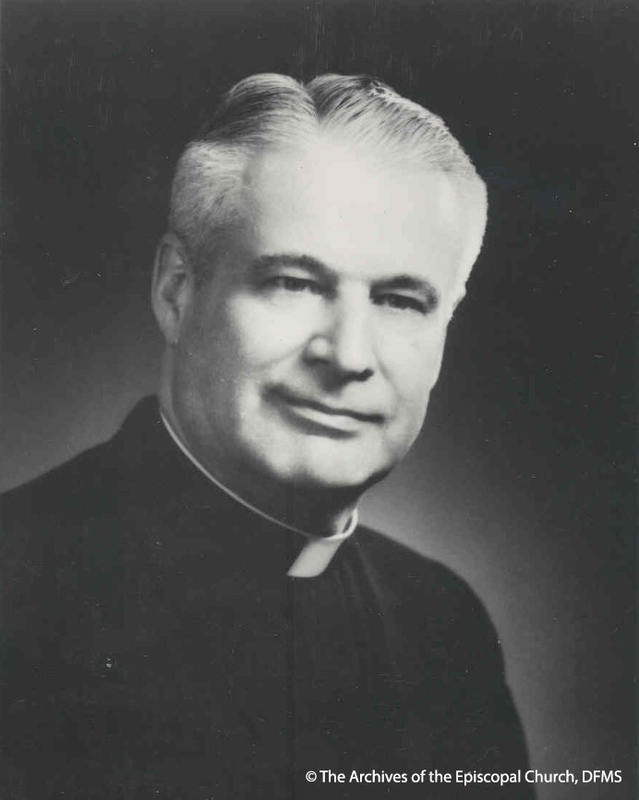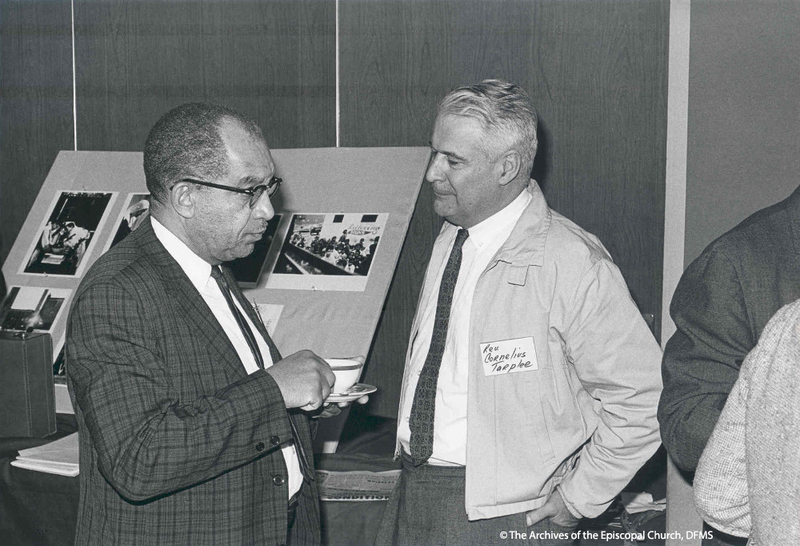Leadership Gallery
The Reverend Cornelius Tarplee, 1911-1970
Cornelius "Neil" Tarplee, co-founder of ESCRU and Executive Council member, was born at LeRoy, New York, on June 29, 1911, to Frank Tarplee and Mary Louise Large. He graduated from the University of Virginia in 1933, and received his B.D. from the Virginia Theological Seminary in 1936. He was ordained a priest in 1937, the same year in which he married Priscilla Adams.
Tarplee spent the first three years of his career as Priest in Charge of three Florida parishes: St. Mary's in Green Cove Springs; St. Margaret's in Hibernia; and Grace Church in Orange Park. In 1939 he became Minister in Charge of a different trio of parishes, also in Florida: Christ Church in Monticello, St. Clement's in Lloyd, and St. James' in Perry. He was called to Zion Church in Charlestown, West Virginia, in 1942, where he served until 1950. His ministry to the parish was interrupted from 1942 to 1944 when he served as a Chaplain (Lt. Jg) in the U.S. Naval Reserve. In 1950 Tarplee became rector of St. Paul's in Lynchburg, Virginia.
While in Virginia, Tarplee was hired by The Episcopal Church to connect pro-integration Southern Episcopalians across parishes in the South, in the hopes of building a solid network in the midst of a hostile environment. The program, known as “Bridge Building in Areas of Racial Tension,” was conducted with a certain amount of secrecy in its initial stages, as the organizers feared that, if publicized, it would meet with a great deal of resistance. Neil Tarplee visited 26 dioceses in the first four months of his job, which began in 1956.
The following year, he left St. Paul’s in Lynchburg to become the Associate Secretary for the Division of Christian Citizenship, part of the Department of Christian Social Relations of The Episcopal Church in New York. This department had been formed in 1919 to manifest the Church's witness and ministry in social, industrial, and economic justice, and Tarplee brought a deep and pragmatic understanding of Southern racial politics to the job, which he would hold until his death in 1970.
In 1959 Tarplee joined John Morris and Arthur Walmsley as a co-founder of the Episcopal Society for Cultural and Racial Unity (ESCRU). The many articles and studies that he authored, both in his role with the Department of Christian Social Relations (later part of Executive Council) and as a founding member of ESCRU, focused on clear-eyed analysis of the various, and occasionally competing, ideologies contained within the Civil Rights movement. His work explained to the “average” Episcopalian, including many Northern readers disconnected from the reality of the South, the root causes of the emerging protest tactics, such as sit-ins and massive demonstrations. The uncompromising press for full civil rights by the Black church exposed the sharp divisions of opinion among Church members, leading some to doubt that the Church should involve itself in the struggle. To Neil Tarplee the moral imperative was clear and constant: the Church could not afford to ignore cries for justice and equality.
Neil Tarplee died on January 12, 1970. His son, Rev. Cornelius C. Tarplee Jr., became an Episcopal priest in 1980 and is currently canonically resident in the Diocese of Newark. [Sources]



